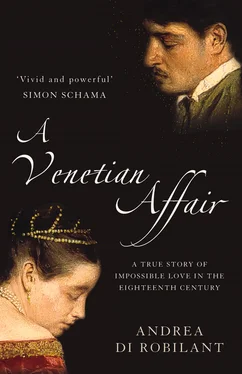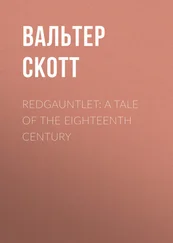1 ...8 9 10 12 13 14 ...21 It wasn’t easy for her to dismiss the things she heard about Andrea, because so much of his life was invisible to her, out of reach. The rumors were all the more hurtful because they reverberated in circles to which she was admitted but to which she did not truly belong. Giustiniana knew or was acquainted with most of Andrea’s friends and was a welcome guest in the houses of many patrician families. But even though the veil of social discrimination was perhaps not as visible as elsewhere in Europe, it was very real; it governed Venetian society in subtle and less subtle ways—as in the case of marriage. When Giustiniana wrote to Andrea about his woman friends, there was often an undercurrent of anxiety that went quite beyond a natural romantic jealousy.
Still, she had her own little ways of getting back at him.
As Andrea and Giustiniana struggled to clear up the misunderstanding about his role in their friends’ affair, Mariettina threw one of her celebrated balls on the Giudecca—an island separated from the southern side of Venice by a wide canal, where patricians had pleasure houses with gardens and vineyards. This was one of the major social events of the season. Preparations went on for days. Young Venetian ladies had a notorious taste for luxury. They liked to wear rich and elaborate but relatively comfortable outfits, so they could move with greater ease during the minuets and furlane , a popular dance that originated from the Friuli region. They spent hours having their hair coiffed into tall beehives, which they decorated with gems and golden pins. Their long fingernails were polished in bright colors. They drenched themselves with exotic perfume and chose their beauty spots with special care (the appassionata was worn in the corner of the eye, the coquette above the lip, the galante on the chin, and the assassina —the killer—in the corner of the mouth). 1 They carried large, exquisitely embroidered fans and wore strings of pearls and diamonds. High heels had long been out of fashion: Venetian ladies preferred more sensible low evening shoes, often decorated with a diamond buckle. These were fabulously expensive but very comfortable, especially for dancing. Men wore the traditional French costume: silk long jacket, knee-length culottes, and white stockings. Elaborate cuffs and jabots of lace from the island of Burano gave a Venetian touch to their attire. Their elegant evening wigs were combed and groomed for the occasion.
Mariettina’s ball offered a chance for Andrea and Giustiniana to see each other and clarify things once and for all. But Giustiniana, still feeling vexed by the whole imbroglio, was not in the mood for such a demanding social event. She sent this note to Andrea just as he was dressing for the evening:
If the bad weather continues I will certainly not come to Marietta Corner’s festa. You know my mother and how she fears the wind. She has warned that she will not cross the canal if there is the slightest bit of wind. In the end it is probably better that such a reasonable pretext should excuse me from coming as I believe you and I would both have a terrible time…. Still I will try to convince my mother to get over her fear—I hope you will acknowledge my goodwill. I have already opted for a new course: henceforth you will be able to do as you please; I will neither complain nor bother you with accusations. When you will cause me displeasure I will try to convince myself that you won’t have done so out of ill will but because you do not believe I am sensitive to those things…. By the way, all those pleas for forgiveness and that habit you have of carrying on exactly in the same manner even though you know you offend me—I really cannot stand it. The truth is, I will continue to give you proof of my real affection while you will hurt me more and more. And who knows if all my suffering will change you one day…. Good-bye now, Memmo. I would not want to keep you from your toilette .
In the end Giustiniana did not prevail over her mother—if she ever tried—and she did not go to Marietta’s ball. The next day she sent Andrea this bittersweet note: “I did not write to you this morning because I felt you might be tired after last night and needed your sleep. The bad weather prevented me from coming, but as I told you I believe in the end it was for the better. Today I was half hoping I would see you at the window at Ca’ Tiepolo, but I guess I fooled myself. This evening we are going to Smith’s. I will write to you tomorrow. I have nothing else to ask you except to love me much—if you can. Farewell.”
Andrea always reacted defensively, even impatiently, to Giustiniana’s outbursts of jealousy. He was not immune to similar feelings, but in the abstract he espoused what he considered a “philosophical” approach. “It is practically impossible for me to be jealous,” he explained:
Not because I have such high esteem for myself that I do not recognize others might be worthy [of your attentions]. No, the reason is that I don’t want to believe you are flighty or coquettish or fickle or careless or mean. If ever there came a point in which I really did nurture doubts about you … then I would simply think of you as a different woman. The pain I would feel on account of your transformation would certainly be intense, but to me you would no longer be the lovable, the rarest Giustiniana. And by losing what ignited my deepest love and continues to nourish it, I would lose all feeling for you and return to the Memmo I was before meeting you .
This was the theory. In reality Andrea was fairly quick to lose his cool when other young men prowled around Giustiniana. He was particularly wary of Momolo Mocenigo, better known as Il Gobbo—the Hunchback—on account of a slight curvature of his spine, but in fact rather good-looking and quite the ladykiller. “He was the handsomest of all the patrician gamesters at the Ridotto,” Casanova wrote in his memoirs. 2 When he was not taking bets at his faro table, Il Gobbo hung around the theaters, where he bothered the ladies and tried to make mischief. He especially enjoyed gallivanting with Giustiniana, and her willingness to indulge him annoyed Andrea to no end. Once, after catching her yet again in “a very long conversation” with him, he let her have it: “Everyone knows Il Gobbo for the first-class whoremonger that he is. You should know he once [told me] in front of other people that I should be thankful to him because he chose not to seduce you even though you showed a certain kindness to him…. I refused to give in to such abuse, and I dare say my reaction did not make him very happy…. But why did you have to go talk to him without your mother? Why speak to him practically in the ear? Why whisper to him that you were going to San Moisè so he could then come and tell me with a tone that so displeased me?”
Another evening, Andrea was at home nursing a fever and a terrible sore throat when he suddenly learned that the “first-class whoremonger” was on his way to meet Giustiniana. He became so upset that he dashed out of the house, ran across town, and burst into the busy gambling rooms of the Ridotto. “I looked for you everywhere, and I finally found you in the same room where [Il Gobbo] had just been,” he wrote to her angrily and with a good deal of self-pity. The incident, he assured Giustiniana, had “redoubled the flames that were already engulfing my throat.”
Still, Il Gobbo was a lesser irritant than Piero Marcello, the handsome coureur de femmes who was courting Mariettina Corner but also had eyes for Giustiniana. Andrea considered Piero to be frivolous and vain, the sort of young man who would buy a new coat and then “make a ruckus just to attract attention to it.” Piero’s gondola was often moored at the same dock as the Wynnes’. “How appearances can trick one,” Andrea noted, for he was worried people might wrongly assume that Piero was visiting Giustiniana and her sisters, when in fact Piero simply lived nearby. Indeed, some already referred to them as “Piero Marcello’s girls.” Piero not only flirted with Giustiniana, he also needled Andrea in public, wondering aloud whether he and Giustiniana were secretly still seeing each other. The two nearly came to blows over her, as Andrea reported to Giustiniana with more than a hint of braggadocio in this account of their confrontation:
Читать дальше












